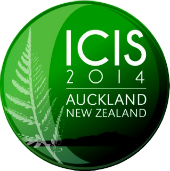The ICIS 2014 Theme Track, “Building a Better World Through IS,” aims to feature novel and practical IT-related solutions to societal problems. This “Societal Impacts of IS” Track aims to provide input to the designers of such solutions through better theory and empirical evidence about the actual or potential societal consequences of IT use and effective intervention strategies.
The “law” of unintended consequences reminds us that all purposive action—including IS design and implementation—has unanticipated outcomes. Sometimes, the unanticipated outcomes of new technology are beneficial. However, a large body of social science research supports the conclusions that the positive outcomes of technology are often accompanied by negative “side-effects”, and that the results of technology implementations are occasionally perverse—the opposite of what had been intended.
Being mindful of such “worst case” outcomes and anticipating them upfront is widely believed to promote better technology design and more effective after-the-fact responses, if and when negative consequences emerge. The pervasiveness of technology, its growing embeddedness in our lives, and its ability to link networks of individuals, groups and artifacts over time, space and levels of analysis make it increasingly difficult to foresee such consequences and delineate the boundaries of the phenomena we study.
The “Societal Impacts of IS” Track emphasizes theory and research about the actual and potential intended and unintended societal consequences (positive, negative, and perverse) of information systems and technologies. “Societal” consequences comprise a wide range of individual, social, ethical, economic, and hazard-related issues, such as better or worse quality of life and work, social inclusion/exclusion, (non)discrimination, (un)employment, and financial or social (in)stability A key challenge is in identifying trade-offs between these outcomes and selecting the relevant criteria for making such decisions. The IS field is uniquely placed to contribute to such discussions due to its fine-grained knowledge of both the technical and the social (including organizational and inter-organizational) dynamics of IT infrastructures. The perspectives of IS scholars enable rich descriptions and explanations of IT’s societal impacts and important insights into effective ways of addressing them.
Topics of interest include, but are not limited to:
● The impacts of Big Data mining in science, innovation, marketing, social life, etc.
● Societal consequences of autonomous agents and robots, e.g., automated securities trading
● Effects of emerging technologies, e.g., 3D printing, quantum computing, affective systems, ambient intelligence
● Work stress, overload, addiction, financial victimization, illegitimate surveillance
● IT-related unemployment and deskilling, especially in knowledge work
● The role of IT in social protest and economic or educational (in)equality
● Theoretical perspectives on unintended consequences and intervention approaches (IT design, IT use practices, IT management policies and governance mechanisms, reaction strategies)
● Methods for assessing social, ethical and other impacts of IS
● Integration of foresight analysis techniques into IS research and IS design science
● Case studies and analyses of IT misuse
● Participation of citizens, governmental policy makers, and other stakeholders in IS research
● Responsible IS innovation
● Incorporating societal concerns (such as ethical issues) in IS planning and governance
● Surfacing the philosophies or ideologies underlying current IS investment evaluation models
Track Chairs
|
Bentley University |
|
|
Auckland University of Technology |
|
|
De Montfort University |
Associate Editors
|
Kathy Chudoba |
Utah State University |
|
Amit Das |
Qatar University |
|
Antonio Diaz Andrade |
Auckland University of Technology |
|
Anat Hovav |
Korea University |
|
Richard Lucas |
University of Canberra |
|
Nigel Patrick Melville |
University of Michigan |
|
Shaila Miranda |
University of Oklahoma |
|
Anne Rutkowski |
Tilburg University |
|
Jacques Steyn |
Monash University at South Africa |
|
Monideepa Tarafdar |
Lancaster University |
|
Angsana A. Techatassanasoontorn |
Auckland University of Technology |
|
Richard Vidgen |
Hull University |
|
Stephanie Watts |
Boston University |
|
David Wright |
Trilateral Research |
|
Yong Kwang Yeow, Adrian |
Nanyang Technological University |
|
Yingqin Zheng |
Royal Holloway University of London |



